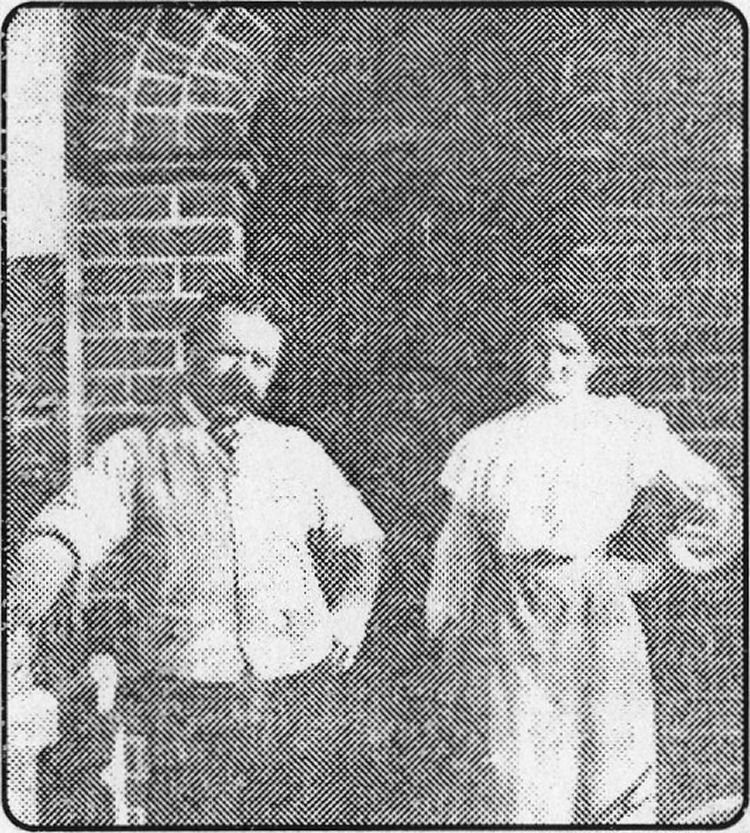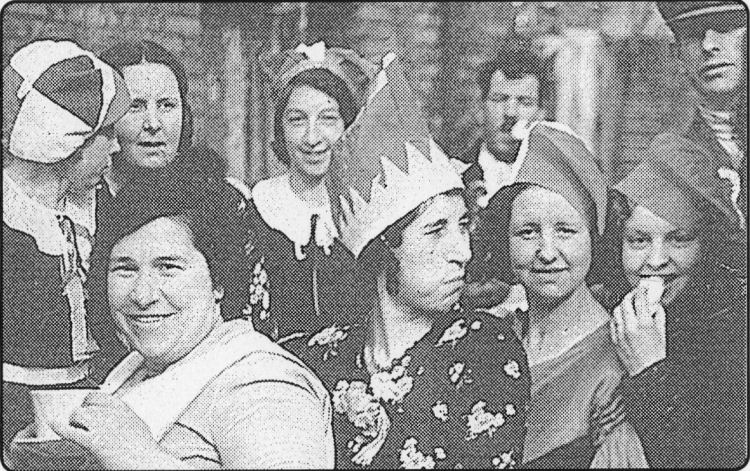Page Updated:- Sunday, 07 March, 2021. |
||||||||||
 From the Folkestone Herald Published 6 July 2000 Sensation! RESEARCHING your family tree there’s no telling what you may discover. Family feuds, scandal, mysteries - even murder. And thats just what housewife Mrs Brenda Howlett, of Wheatley, Halifax, found out. 
MURDER victim Mrs Margaret Bauldry, left, as a laundress. Right, her husband, William, arrives at the inquest by horse-drawn cab under escort. He is handcuffed and looks as though he has a ball and chain. Both pictures are from the Folkestone Herald of the time.
“It was a dreadful shock,” she told me “when I found a report in the old Hythe Reporter newspaper for October 17,1908 that a great aunt or cousin, it hasn't quite sunk in which, was murdered in a rented room of a newly-built Saltwood property, Franklyn Cottages, by her husband William.” The unfortunate victim was Mrs Margaret Elizabeth Bauldry (nee Cloke), 33, who used to work at the Metropole Laundry, Hythe. That such a thing should happen in one of the normally quiet and one of the prettiest villages In the area came as a shock to most people. The old Hythe paper, like the Folkestone Herald and another contemporary, the Folkestone Express, that I consulted, naturally went to town on the story of the brutal murder and carried several photographs, including one of the alleged murderer. And Mrs Howlett is wondering If any Memories reader has an original photograph connected with the Incident such as one of the Metropole Laundry staff. Her phone number is 01422 362207. In 1980 papers were not restrained so much by the law protecting people’s rights, as the press is today. An inquest on the dead mother was held within a couple of days of the murder and the papers were full of it. The house in which the killing took place was just off the road leading to Sandling Junction Station. 
SCENE of the murder and key witnesses Mr & Mrs Wraight.
No. 1 was the home of Albert and Nellie Wraight, and also Mrs Bauldry, and her son Stephen, aged about two, who had been found a room there after she was separated from her husband. Her mother lived nearby. Previous to their separation the couple had lived In Horn Street, Seabrook. According to the unrestrained reports in the newspapers the couple’s marriage had been most unhappy. The Express said “the husband at times was extremely quarrelsome, and altogether life for the woman was scarcely worth living, owing to his bad temper.” There were continual bickerings, Mrs Bauldry's health suffered as a result of a miscarriage while working in the hopfields at Chilham and “Her husband was unemployed, and certainly not a man who appeared willing to do much to gain a good livelihood.” Bauldry, 41, an ex-Bedfordshire Regiment soldier, took the three oldest children to live in his mother's house in Boxley Square, Hythe. Things came to a head after Mrs Bauldry sent her husband a note about the ‘bad boots’ she had seen their daughter May wearing in Hythe, asking him to keep her in doors until she, the mother, could send her a new pair for she feared the child would be crippled. Attacked landlord. Incensed, Bauldry went to the Wralghts’ house where he had a heated row with his wife In the presence of Mrs Wraight. Eventually Mr Wraight arrived and when he remonstrated with Bauldry about the quarrelling the accused attacked him, a violent blow on the back of the head knocking him to the ground. Mrs Bauldry rushed from the kitchen with her child in her arms and Mrs Wraight saw Bauldry fumbling about in a pocket as he followed his wife and caught hold of her. Mrs Wraight called to her husband that the woman was being murdered and then ran out to call In a neighbour. When Mr Wraight went Into the kitchen he saw the woman being held down at the bottom of the stairs by Bauldry who held a knife. “He attempted to pull the man off the women, but finding that he could not, he ran for the police constable's house, about two minutes away.” “On his return he saw that the woman had a deep cut in the throat. A neighbour by then had taken the baby, unhurt, from its mother's arms. “There was blood on the floor where the woman had been dragged across It. The husband at once decamped, but later went to his mother’s home.” Pc George Willson who went to search for Bauldry arrested him in the taproom of the "Gate Inn," Market Street, Hythe and arrested him on a charge of cutting his wife's throat, not knowing then that she had died. Bauldry, who had worked for several years at the Hythe School of Musketry, seemed unconcerned about the serious position he was in. in the course of Inquest evidence Bauldry blurted out: “I must admit I done it, but ...." However, he was stopped by the Coroner from saying any more and urged to only ask questions of witnesses. He also claimed his wife fell on the knife. Bauldry was tried at the Assizes at Maidstone in November when the prosecution described the killing of Mrs Bauldry as “a dreadful and cold-blooded murder.” Bauldry pleaded not guilty, claiming the stabbing was an accident. He said his wife had been very good to him and to their four young children. He had no reason to harm his wife. It made his heart break to think of the poor children, he said. He claimed he had suffered for two years from a ‘‘diseased head” through no fault of his and had a heart condition causing discharge from the Army after eight years. But he was found guilty after the jury had retired for half an hour to consider their verdict, although the foreman of the jury issued a strong recommendation for mercy, on the grounds that Bauldry did the deed in a moment of frenzy. Putting on the traditional black cap Judge Ridley sentenced Bauldry to be hanged. Execution was at Maidstone Prison early in December. Bauldry had hoped to see his mother and children before celebrated hangman Pierpoint dispatched him, but only his mother went to see him. And he went silently to his death.

In Memories on June 22 I featured 1937 photographs of Bridge St
Coronation tea party from Alan Taylor saying I would feature more of the
photos made from old lantern slides and I hope to do so next week.
|
||||||||||
|
If anyone should have any a better picture than any on this page, or think I should add one they have, please email me at the following address:-
|
||||||||||
| LAST PAGE |
|
MENU PAGE |
|
NEXT PAGE | ||||||
